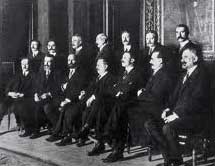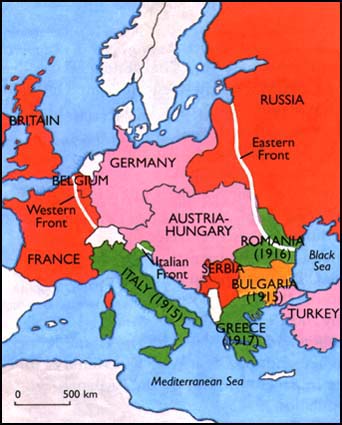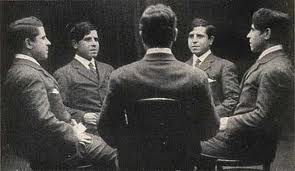The Generation of '14 & Noucentisme overview
Around 1910, the Modernists and the writers of the Spanish Generation of '98 had already produced their best results. A new generation of writers arrived on scene: Generation of '14. This name groups certain writers that don't fit in the Generation of '98 or the Generation of '27.
Spanish Generation of '14

These authors don't have a group conscience, but they do share some features: they were intellectuals, with a will to teach the minorities, and their reflections on Spain are more serene and objective than those of the Generation of '98. Also, they had al started their literary activity during the 20th century, and had reached their maturity around 1914.
The Spanish Generation of '14 was an evolution from the previous generation of writers. While in the latter there was a spirit of renovation and independence, the Generation of '14 uses more scientific methods, and more reflexive and modern standards. They're not a renovation of the previous generation, but an evolution. The passion that the writers of '98 expressed turns into a more serene and collected opinion, often ironic, but not less felt. The main representative of this Generation of '14 is the Spanish essayist and philosopher Ortega y Gasset.
Their main organ of expression was the magazine "España", founded by Ortega y Gasset in Madrid in 1915. all the writers of this generation used this magazine to publish and diffuse their works, which were mostly essays and journalistic articles.

The outbreak of World War I was a very significant event for this generation, so much in fact that they obtain their name from it, but not as much as it meant for the literary movements in other countries which took part in the war (these generation are known as lost boys or generation du feu). The neutrality of Spain in the conflict brought severe social, economic and political consequences, like the crisis of 1917. In the intellectual plane, the war meant the division between those who took the side of the Central Powers (Germanophiles) and those who took the side of the Allies (Francophiles and Anglophiles).
The general characteristics of the Spanish Generation of '14 are:
- Rationalism and systematization: the members of this generation have a solid intellectual education and a systematic way of presenting their proposals.
- The attention is focused on he cities and their civilizations, as a break with previous movements who set their sights in the rural life.
- Europeanism and concept of Spain: this generation feel attracted to the European culture, and they analyze Spain's problems from their new perspective. Their proposal is the intellectual modernization of Spain, although most of them don't share their views on the matter.
- Transforming activism and search for power: incorporation into the official life to take advantage of the power that comes with it to change the country. They considered their proposals so important that they can't limit it to their texts, they have to be conducted from powerful positions. This why many of them lead a political life.
- Intellectualism: they reject sentimentalism and personal exaltation in favor of the rational analysis of art and even poetry.
- Aestheticism and dehumanization of the arts: art for the sake of art, and not for the feelings hidden behind it. In poetry, this produces the genre known as "pure poetry".
- Classicism: the classical models are used again, and serenity becomes an aesthetic factor.
- Formalism: concern about the forms. This wish produces a thorough depuration of the language, a perfection of the forms and thus, art for minorities.
- Elitism: as a consequence to the previous point.
- Concept of aesthetic, intellectual and social vanguards: this change emerges from a minority, which justifies the election of a difficult literature, elitist and for the minorities. The other option is to transform the way the masses perceive everything so that they too can access all types of art, science and culture, even in it's more elitist forms. If the modernists had lived an ideological crisis, the writers of the Generation of '14 suffered a sociopolitical crisis.
Noucentisme

In Spanish schools in Spain, they teach that Noucentisme is another name used to designate the authors of the Generation of '14, although there are very slight differences between the two terms. The term "noucentisme" was coined by Eugenio d'Ors, and it's technically more restricted to the cultural movements in Catalonia (mostly Barcelona). These artists (writers, painters, sculptors...) wanted to elevate the Catalonian culture to the level of the European culture. Like the Spanish Generation of '14, they searched for the perfection and beauty in their forms. They used archaic words and classical references, as well as harmonic rhythms.
The Noucentists didn't have a group conscience, but they do share some features between them and with the Generation of '14, like their intellectual education, their use of essays as the main form of expression, their Europeanism and the constant obsession for a job "well done", very polished and far from any improvisation.

